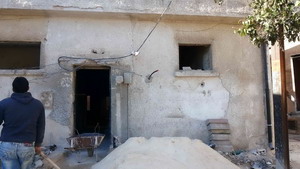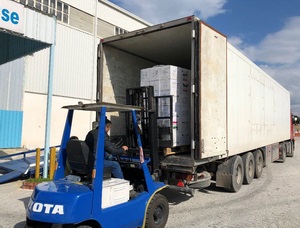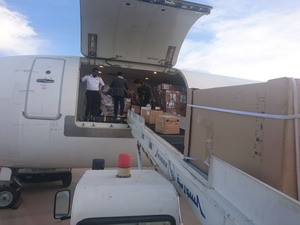WHO health assessment to Al-Mouaddamiyeh in Rural Damascus
 Primary health care centre at Al-Mouaddamiyeh being rehabilitated with WHO support. WHO Syria 201828 February 2018 – WHO has participated in an inter-agency mission to assess health needs in Al-Mouaddamiyeh (Rural Damascus). This area, which recently became accessible following years of siege, is home to over a hundred thousand people. According to the local mayor, the numbers are likely to increase given the new-found stability in the city.
Primary health care centre at Al-Mouaddamiyeh being rehabilitated with WHO support. WHO Syria 201828 February 2018 – WHO has participated in an inter-agency mission to assess health needs in Al-Mouaddamiyeh (Rural Damascus). This area, which recently became accessible following years of siege, is home to over a hundred thousand people. According to the local mayor, the numbers are likely to increase given the new-found stability in the city.
The assessment team, which included representatives of the Syrian Arab Red Crescent, found that years of conflict had taken a toll on the city. Its main primary health care (PHC) centre had been damaged and its water supply network was no longer functioning, leaving people dependent on water tankers. The team also found that thousands of children under 5 years of age had not been vaccinated and that around 6000 students from 7 to 18 years of age had no access to PHC or mental health services in schools.
WHO delivers life-saving health supplies to Deir-ez-Zor governorate
 7 February 2018 - The World Health Organization (WHO) dispatched 14 tons of life-saving medicines, anesthetics, antibiotics, emergency medical kits and other treatments to Deir-ez-Zor governorate this week to urgently respond to the critical health needs of people in north-east Syria. The shipment contains more than 303 000 treatments for ill and wounded children, women and men.
7 February 2018 - The World Health Organization (WHO) dispatched 14 tons of life-saving medicines, anesthetics, antibiotics, emergency medical kits and other treatments to Deir-ez-Zor governorate this week to urgently respond to the critical health needs of people in north-east Syria. The shipment contains more than 303 000 treatments for ill and wounded children, women and men.
Many Syrians who have recently returned to Deir-ez-Zor have found that their homes have been damaged or destroyed, and that health care facilities in the area are closed or are only partially functioning. Recent assessments indicate that more than 40% of the governorate’s hospitals and primary health centres were forced to close following heightened conflict in 2017.
17 tons of medical supplies airlifted to Al-Hasakeh governorate in northeast Syria
 6 February, 2018- The World Health Organization (WHO) has airlifted 17 tons of medical supplies to Al-Hasakeh governorate, Syrian Arab Republic, as part of its continued efforts to alleviate the suffering of hundreds of thousands of internally displaced people (IDPs) and critically ill patients in north-east Syria.
6 February, 2018- The World Health Organization (WHO) has airlifted 17 tons of medical supplies to Al-Hasakeh governorate, Syrian Arab Republic, as part of its continued efforts to alleviate the suffering of hundreds of thousands of internally displaced people (IDPs) and critically ill patients in north-east Syria.
The airlift contains enough supplies to treat at least 380 000 people, including those wounded as a result of the ongoing conflict.
The provision of these critically-needed medical supplies is part of WHO’s commitment to boosting the health system in north-east Syria by donating life-saving medicines and essential equipment to overstretched health care facilities in Al-Hasakeh, Rural Ar-Raqqa and Rural Deir-ez-Zor governorates.
WHO ensures life-saving treatment for cancer patients in Syria with support from Kuwait
 Hamad receives a gift package from WHO on World Cancer Day. Hamad has to come to the hospital for 5 days every 3 months to be treated for leukemia. WHO/Syria5 February 2018 – Thirteen-year old Hamad from rural Hama, Syrian Arab Republic, is being treated for leukaemia at the Children’s Hospital in Damascus. On Sunday 4 February, he met Elizabeth Hoff, the WHO Representative in Syria, when she visited the hospital on the occasion of World Cancer Day. He and the other children in the ward received a gift package that included a school bag, colouring book and other items. “Thank you for the bag, I will use it when I go back to school”, said Hamad. “I want to study hard and become a neurosurgeon when I grow up.”
Hamad receives a gift package from WHO on World Cancer Day. Hamad has to come to the hospital for 5 days every 3 months to be treated for leukemia. WHO/Syria5 February 2018 – Thirteen-year old Hamad from rural Hama, Syrian Arab Republic, is being treated for leukaemia at the Children’s Hospital in Damascus. On Sunday 4 February, he met Elizabeth Hoff, the WHO Representative in Syria, when she visited the hospital on the occasion of World Cancer Day. He and the other children in the ward received a gift package that included a school bag, colouring book and other items. “Thank you for the bag, I will use it when I go back to school”, said Hamad. “I want to study hard and become a neurosurgeon when I grow up.”
“Thanks to a generous new donation from Kuwait, WHO will be able to cover the cost of treating children like Hamad who suffer from cancer. This US$1 million grant will be enough to provide over 7 months’ treatment for the approximately 1500 cancer patients admitted each year to the Children’s Hospital,” said Ms Hoff.


